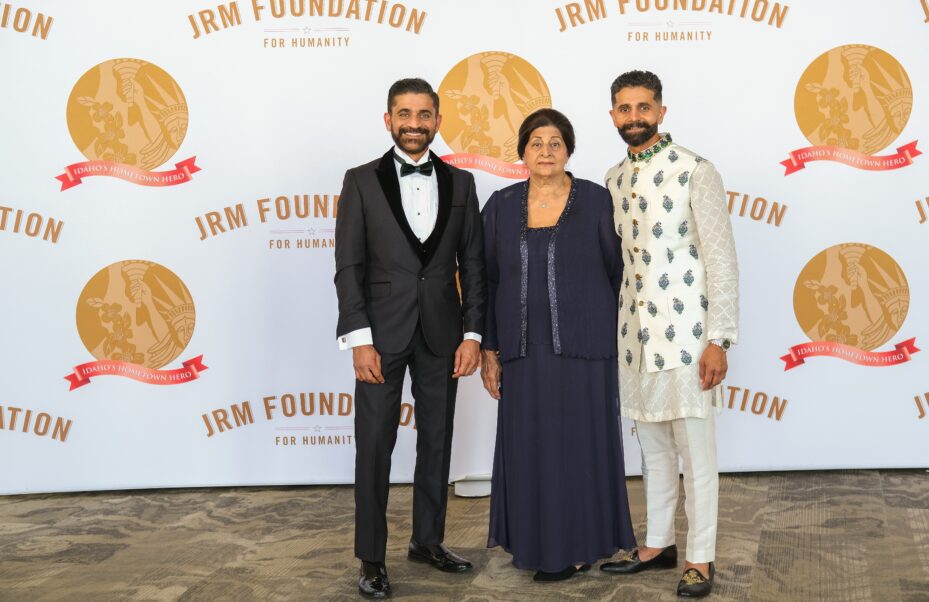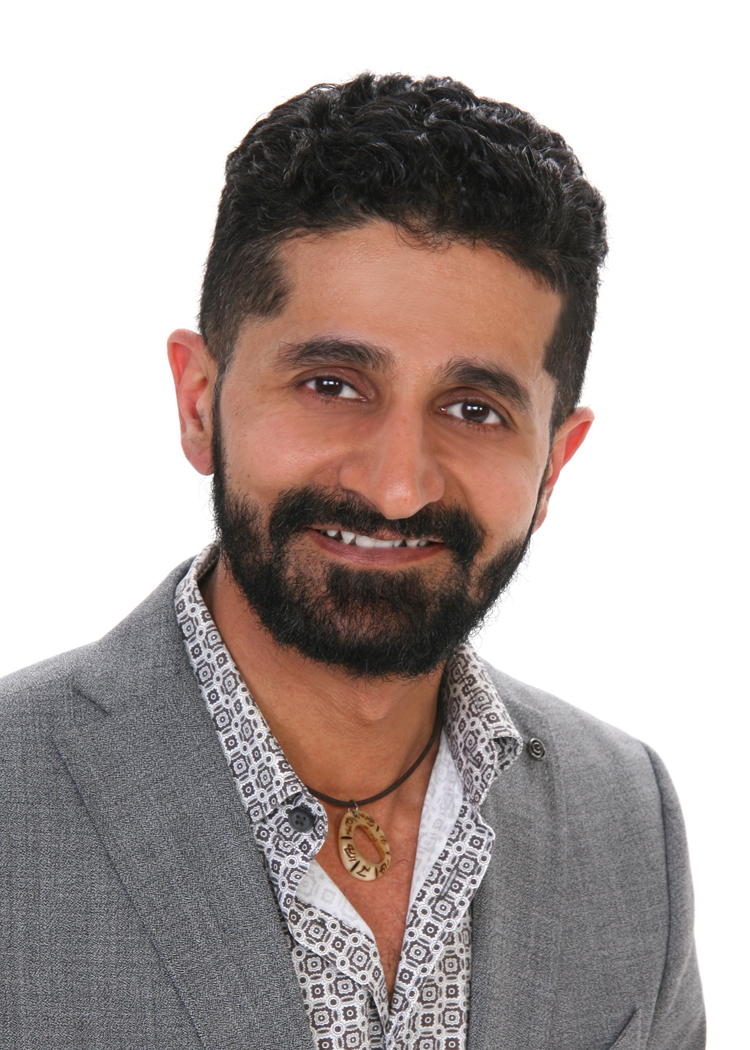Dr. Fahim Rahim, WG’24, is on a mission to expand healthcare access. Through the JRM Foundation for Humanity, Fahim leads humanitarian missions across the globe that combine his passion for helping local communities with the thrill for hiking and climbing ventures. To date, the foundation’s #Hike4Humanity trekkers have completed more than two dozen fund-raising mountain climbs in Mexico, Ecuador, Pakistan, Nepal, Switzerland, Argentina, and the U.S. These efforts have helped open a medical clinic in Nepal, support a pediatric transfusion center in Pakistan, and provide educational programs to children in underserved areas across the world. Now, Fahim is embarking on a new adventure: earning a Wharton MBA while continuing his full-time work as Co-Founder and Chairman of the Idaho Kidney Institute, one of the largest providers of kidney disease care in Idaho.
Clearly a busy man, Fahim made time for an interview with Wharton Stories, where he discussed both his important work and his time at Wharton thus far.
Why is now the right time for a Wharton MBA?
I’ve been a physician and healthcare business owner for almost two decades; and with everything I’ve seen, I believe it’s time for a change in the U.S. healthcare system. The way things are currently operating is not sustainable, both from a cost-effectiveness or access standpoint. If physicians equip themselves with foundational business knowledge, they will be able to implement change within the system more effectively. I feel a burning desire to take on this responsibility, but want more tools in my toolbox to help with my decision making and efficiency. Both of my long-term business partners have MBAs, and I’ve seen what they have achieved professionally. I knew Wharton would give me the education I needed to accelerate change in healthcare.

How has the Wharton MBA Program for Executives impacted your career?
One of the best parts of this program has been learning new business concepts during class weekends and immediately putting them into practice at work on Monday. Of course, the core subjects like accounting and economics have been applicable, but the humanities and “soft skills” courses have also made an impact on how I do business. For example, in the first term I took Managing the Enterprise with Professors John Paul MacDuffie, Zeke Hernandez, and Nicolaj Siggelkow. This course showed me how to understand the internal workings of a firm and create a global strategy using insights drawn from economics, sociology, psychology, and the political landscape. Responsibility in Global Management with Professor Peter Conti-Brown was another enlightening course which focused on navigating ethical and legal challenges as a business leader. These courses made me think about my own work and identify areas I can improve upon using what I learned in class. The core business concepts are the same, whether you’re running a for-profit or a non-profit. I know the impact of my work will be exponentially bigger and wider from what I’m learning in this program.

What inspired you to found the JRM Foundation for Humanity?
The idea started in 2011, when my brother Naeem and I were awarded the Ellis Island Medal of Honor for our work with the Idaho Kidney Institute. Each year, the Ellis Island Honors Society gives out an award to those who have shown an outstanding commitment to serving our nation either professionally, culturally, or civically. We were the first Idahoans to earn this honor, but we knew that there were many deserving people in our state who were medal worthy. This inspired us to start Idaho’s Hometown Hero Medal, Idaho’s first civil medal. Each year this award pays tribute to individuals who embody characteristics and achievements that are uniquely Idaho. The JRM Foundation for Humanity was developed in affiliation with the Hometown Hero Medal, in honor of our relatives from the Jamshaid, Rahim, and Mannan families. Our main mission is to be an agent of positive change by supporting programs and charities that promote women and children’s health and education. We aim to be available for our partners in times of natural disaster and pandemics by providing shelter, clean water, food, essential supplies, and medical care. Our missions have expanded beyond Idaho, and our JRM Ambassadors are doing incredible work in rural, mountainous communities in Nepal and Pakistan.

Can you tell us more about #Hike4Humanity and #Climb4Humanity?
The hiking and climbing initiative started twelve years ago, when the JRM Foundation for Humanity built our first clinic in Nepal’s Khumbu Valley. It took me, my wife, and kids three days to hike to this village. The next day, 200 patients showed up. At that time, the clinic was basically a hut made of rocks with no electricity. I remember we were up until 2 a.m., wearing headlamps and treating patients who had never seen a physician before. We kept going back and doing more work with the clinic, and eventually the sherpas began taking us on local hikes. One thing led to another, and now we’re climbing 20,000-foot mountains all over the world! Through #Climb4Humanity and #Hike4Humanity, climbers and trekkers help raise funds to acquire resources for our work in these communities and local communities in Idaho.
The JRM Foundation for Humanity Ambassadors recently attempted to summit Ama Dablam, a 22,350-foot mountain in Nepal close to Mount Everest, to help support a rural clinic in Pakistan. This clinic provides monthly, life-sustaining blood transfusions to children with thalassemia, an inherited blood disorder. Each month, 250 children rely on this clinic as part of their treatment. I flew directly from San Francisco to Nepal after a Wharton EMBA class weekend to complete that climbing mission. My brother and I were born in a small town in Northern Pakistan, and it means a lot to us to be able give back to rural communities in any part of the world. Many of these villages don’t have strong infrastructure or financial support, so we’re doing what we can to help. The JRM Foundation for Humanity is small, but small things can have huge impacts. These communities have relatively small needs from a financial perspective, but the return on investment is invaluable.
How has the program impacted you personally?
One of the most beautiful parts of this experience has been bonding with my kids in a new way. I applied to the Wharton MBA Program for Executives at the same time my middle daughter was working on her college applications. We would sit in the same room, each typing away on our application essays. Obviously, there was some overlap in our stories, so it was fun to swap essays and give each other feedback. This past term, we all had final exams on the same weekend, and I felt very lucky to share that life experience with my daughters. Overall, returning to school has been humbling. It’s been 25 years since I finished medical school, so getting back into a highly structured and organized way of learning was an adjustment. I remember getting my first quiz back and scratching my head, thinking to myself, ‘I thought I was a smart guy!’ But that was rejuvenating, discovering how much there is still to learn. When you have an attorney, a Google product manager, a blockchain expert, and a physician all working together as a learning team to solve a case, it escalates your own personal learning to a very different level. The Wharton MBA Program for Executives is no different than climbing a tall mountain; you just have to take it one step at a time.
—Kendra King
Posted: March 1, 2023
























